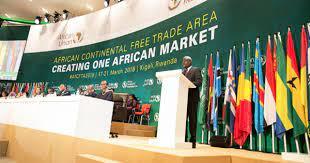
Analyzed and adopted on May 19, 2022, the African Continental Free Trade Area constitutes a vast inter-African market. The integration of Burundi into this zone will strengthen the economic and industrial objectives of the country. It will also enable the promotion of trade and investment and better exploitation of private sector prospects. However, Burundi remains in deficit in terms of exports compared to imports.
The objectives of the AfCFTA are, among other things, to create a single continental market for goods and services with the free movement of people and investments, thus paving the way for the acceleration of the establishment of the continental customs union. “The AfCFTA should also strengthen the competitiveness of industries and businesses through the exploitation of large-scale production possibilities, access to the continental market and better allocation of resources,” specifies Ms. Daya Bragante, head of section sub-regional initiatives within the United Nations Economic Commission for Africa.According to the World Bank report, countries that succeed will be able to attract foreign investment and stimulate competition, factors that will increase the productivity and innovation of national companies. Implementation of the agreement would also result in larger wage increases for women than for men by 2035, with increases of 10.5% and 9.9% respectively. It would also increase the wages of unskilled workers by 10.3% and those of skilled workers by 9.8%.According to the report, intracontinental exports would increase by 81% while exports to non-African countries would represent 19% given that intra-African trade represents only 15% of the continent's total trade compared to 70% for the European Union. However, export products with low added value Trade constitutes an engine of economic development in our country where the majority of foreign exchange comes from exports. However, it is clear that exports to the rest of Africa, although having surpassed exports to the rest of the world in 2015 and 2016, have declined significantly in recent years.The fall in the country's exports to African countries is explained by the country's poor performance in terms of diversification of its exports. These mainly concern services, agricultural and mining products which have low added value. On the other hand, exports of manufactured products are almost non-existent. It is hoped that the implementation of the AfCFTA in Burundi could undoubtedly be the long-awaited solution to remedy this. It will increase intra-African trade by reducing tariff and non-tariff barriers to its trade with African countries. It will also improve prospects for export diversification of manufactured products.The AfCFTA represents an opportunity for Burundi to accelerate its industrialization in accordance with the objectives of the National Development Plan (PND 2018-2027), especially since the third axis of the PND advocates a dynamic, diversified and competitive industry at the regional and international level. .The Ministry of Foreign Affairs and Development Cooperation organized on Tuesday, May 18, 2021, an awareness workshop on the sub-regional and regional commitments made by Burundi within the framework of regional integration, to assess the achievements undertaken by Burundi while referring to the National Development Plan (PND).In his speech during an awareness workshop on regional and sub-regional commitments undertaken by Burundi as part of regional integration organized on May 18, 2021, Isidore Ntirampeba, then permanent secretary at the Ministry of Affairs Foreign Affairs and International Cooperation indicated that Burundi's achievements in regional integration do not yet match its ambitions. He deplored that Burundi remains a sales market instead of participating in this intra-community trade. Need for private sector involvementOther more numerous activities require the intervention of the private sector and partners to position Burundi in this African market. “This is why we are launching a vibrant appeal to everyone to work together in our interventions with a view to promoting Burundi’s trade, and therefore the image of the country,” concluded Mr. Ntirampeba.On the side of the Federal Chamber of Commerce and Industry of Burundi (CFCIB), Ginette Karire, vice-president of this chamber, indicated that intra-African trade hovers around 14% in simple terms. “Africans buy from Africans only 14% of the products they import and buy 86% of the products they import from outside the continent despite the existence of Regional Economic Communities. As for intra-European trade, it amounts to 70%.” Ms. Karire calls on the government to think about facilitating the participation of the private sector in the current negotiations.
January 31, 2020 | 802 views
October 21, 2023 | 518 views
© 2023 EJOHEZA NEWS Designed by DSCOMPANY



 Français
Français Ikirundi
Ikirundi